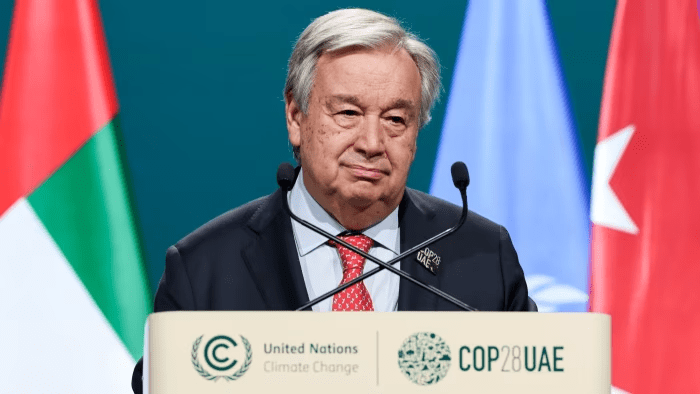In Short : The UN Secretary-General criticizes the COP28 presidency’s net-zero charter. This suggests strong disapproval or condemnation, possibly indicating concerns about the charter’s efficacy or its alignment with global efforts to address climate change. The criticism emphasizes the need for more robust and effective measures in the pursuit of net-zero targets.
In Detail : Plans launched by summit president Sultan al-Jaber ‘clearly fall short of what is required’, says António Guterres
UN secretary-general António Guterres has criticised emissions reduction plans launched by COP28 climate summit president Sultan al-Jaber, saying they “clearly fall short of what is required”.
Jaber, who has dual roles as chief executive of the Abu Dhabi National Oil Company and head of this year’s climate summit in Dubai, brokered a series of pledges as part of a new global decarbonisation alliance.
But less than 24 hours after their launch, Guterres said the agreement “says nothing about eliminating emissions from fossil fuel consumption”.
“Science is clear: we need to phase out fossil fuels within a timeframe compatible with limiting global warming to 1.5 Celsius,” the UN chief said on Sunday. “In addition, [the] announcement provided no clarity on the pathway to reaching net zero by 2050, which is absolutely essential to ensure integrity. There must be no room for greenwashing.”
Jaber’s package, announced by the UAE COP28 presidency together with Saudi Arabia, included a group of about 50 leading oil and gas companies committing to cutting emissions from their operations to net zero by 2050. The agreement included ExxonMobil, TotalEnergies, BP and Shell, alongside state energy companies Saudi Aramco and Adnoc.
But it did not cover the bulk of greenhouse gases that result from end consumers’ burning of their oil and gas products, and none of the companies agreed to cut production.
British academic and carbon footprint expert Mike Berners-Lee described the package as “nonsense”, citing the lack of short-term targets for cutting oil and gas companies’ overall emissions. “2050 is way too late unless huge cuts are made right now,” he added, in a post on social media.
Guterres also said a parallel plan drawn up by 116 countries to triple renewable energy capacity was welcome, but “lacks a comprehensive strategy to tackle our reliance on fossil fuels”.
The International Energy Agency has said a brake on new oil, gas and coal development is needed to reach net zero emissions by 2050.
This target is central to the Paris Agreement goal of limiting global warming ideally to no more than 1.5C above pre-industrial levels. The global temperature rise is already at least 1.1C.
The IPCC’s latest summary of climate science said in March that projected emissions from existing fossil fuel infrastructure alone exceeded the levels of carbon required to keep warming to below 1.5C.
Ministers from the Marshall Islands and two other island nations vulnerable from rising seas, Vanuatu and Tuvalu, wrote after the package was unveiled that the clean energy measures should not distract from “the urgent need to phase out fossil fuels”.
In an interview with the Financial Times, IMF managing director Kristalina Georgieva was also critical of fossil fuel subsidies offered by governments, which the IMF estimates have risen to $1.3tn in direct costs annually.
Georgieva said phasing out such subsidies was a “hugely important task”, but one that the world had not “embraced wholeheartedly”.
“It doesn’t make sense to continue to subsidise fossil fuels”, she said, adding: “We know that as humanity we cannot continue.”
UAE COP28 decarbonisation decoded
Global Decarbonisation Accelerator Umbrella plan for energy, industry and transport sectors — collectively responsible for the bulk of global greenhouse gas emissions.
Oil and Gas Decarbonisation Charter COP28 UAE presidency and Saudi Arabia jointly launched plan for 51 companies, responsible for 40 per cent of global oil production, to cut emissions to net zero from their operations by 2050. Voluntary, accounts for only about 15 per cent of total global emissions.
Methane Agreement to “zero-out” methane emissions and eliminate routine flaring by 2030. This does not address the bulk of “fugitive” emissions from coal mines.
Global Renewables and Energy Efficiency Pledge 116 countries signed an agreement to triple worldwide installed renewable energy generation capacity to at least 11,000GW and double the global average annual rate of energy efficiency improvements from about 2 per cent to more than 4 per cent each year to 2030.
UAE Hydrogen Declaration of Intent 27 countries agreed to a global certification standard and to recognise existing certification schemes for hydrogen, without specifying if it is made from renewable energy sources.
Industrial Transition Accelerator Coalition agreed to share information, source finance and conduct lobbying, involving the UN, the UAE and Bloomberg.
Global Cooling Pledge 52 countries agreed to cut global air conditioning emissions by 68 per cent by 2050, or 7 per cent of the global total.
Declaration to Triple Nuclear Energy Signed by 22 countries including the US, UK, Japan, France, UAE and Canada, but not China, Russia or India, which have large nuclear power capacity.

